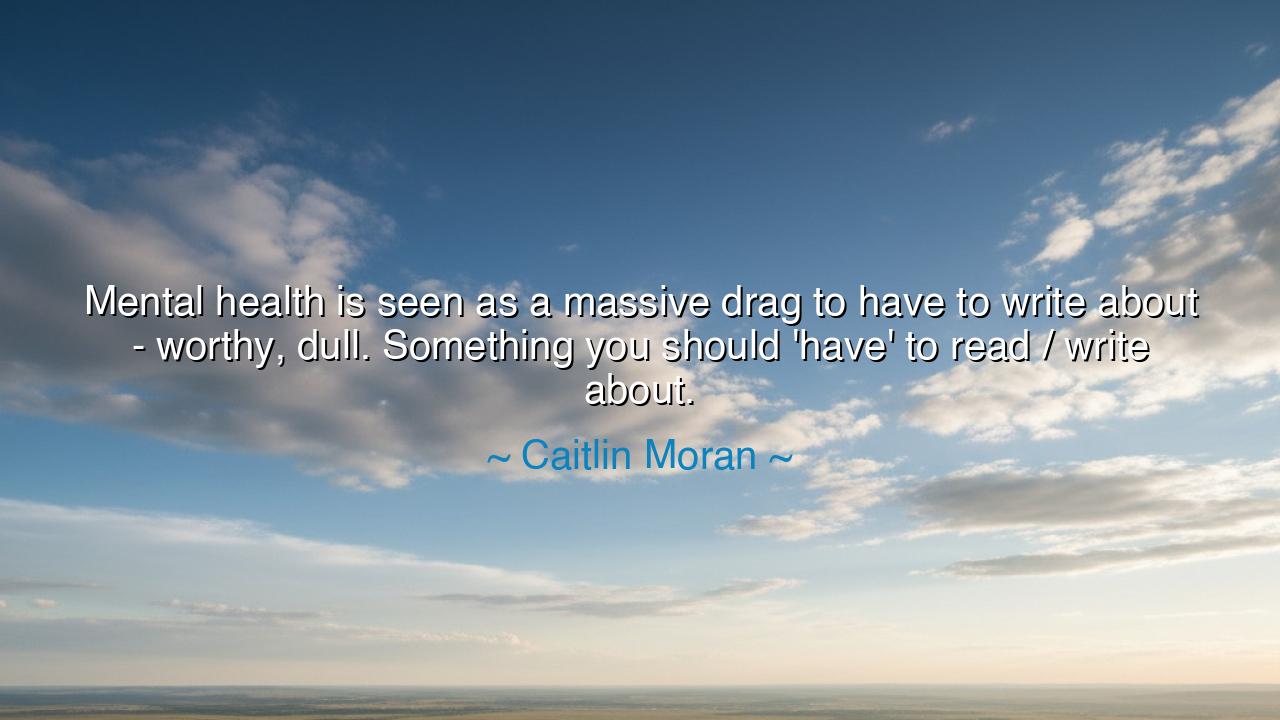
Mental health is seen as a massive drag to have to write about -
Mental health is seen as a massive drag to have to write about - worthy, dull. Something you should 'have' to read / write about.






The fearless writer and truth-teller Caitlin Moran, known for her wit and unflinching honesty, once declared: “Mental health is seen as a massive drag to have to write about—worthy, dull. Something you should ‘have’ to read / write about.” In these words lies a lament for the blindness of our age—the way the world treats the most profound struggle of the human spirit as something tedious, rather than sacred. She names what others dare not: that in a society obsessed with beauty, success, and laughter, the topic of mental health is still cloaked in discomfort. It is spoken of as duty, not desire; as an obligation, not a calling. Her statement is not cynicism—it is prophecy, a mirror held to our culture’s failure to see that the health of the mind is the root of all human flourishing.
In the ancient world, healers and philosophers did not divide the body from the spirit as we do now. The Greeks believed that illness of the mind was as real as illness of the flesh. Hippocrates, the father of medicine, spoke of “melancholia” not as weakness, but as imbalance—something to be treated with compassion, care, and understanding. Caitlin Moran, in her modern tongue, mourns that such compassion has been lost. We speak endlessly of diets, technology, and entertainment, yet recoil when asked to speak of sadness, anxiety, or despair. The subject is labeled “heavy,” “boring,” or “awkward.” But as she reminds us, this very avoidance is the sickness itself—a civilization so frightened of its own vulnerability that it calls honesty a chore.
When Moran says that writing about mental health is seen as a “massive drag,” she is naming the stigma that clings like shadow to the soul. People fear to look inward because the mind is an infinite ocean—beautiful, yes, but also vast, and sometimes dark. To write or read about it requires courage, for it demands empathy, and empathy demands humility. The world is quick to celebrate triumph, but slow to face pain. It would rather turn away from what is uncomfortable, dressing its fear as disinterest. Yet, as the ancients knew, it is only by descending into the shadow that one discovers the light. Moran’s words are an invocation to remember that truth-telling about pain is not “dull”—it is sacred work.
Consider the story of Virginia Woolf, the great writer whose brilliance was matched only by her struggle with despair. She wrote not only of beauty but of the tremors of the human mind—its fragility, its chaos, its yearning. For her, writing was survival. Yet in her time, few dared to call her suffering an illness; instead, they called her tragic, eccentric, or unstable. The world admired her art but turned away from her pain. And so, her life stands as both triumph and tragedy—a reminder that when we dismiss conversations about mental well-being as burdensome, we silence those who most need to be heard.
Caitlin Moran’s words awaken us to a deeper truth: that the stories of the mind are not less worthy than those of the body or the battlefield. To speak of sadness is not to complain—it is to heal. To write of depression, anxiety, or loneliness is not to dwell in darkness—it is to light a torch in the cave where so many silently sit. The ancients had rituals of mourning and rites of cleansing; they understood that emotion, if not expressed, festers. But in our age of polished smiles and curated screens, silence has become the disease of millions. Moran’s quote urges us to break that silence—not as duty, but as devotion to the wholeness of life.
There is courage in what she calls for: to make mental health not an assignment, but a conversation; not a pity, but a pillar of art and culture. The poet, the teacher, the leader, and the friend—each must learn to speak of the mind as they do the heart. For when we share our unseen wounds, we remind one another that suffering is not shameful—it is human. True strength, the ancients would say, lies not in silence, but in the willingness to be known fully, in shadow and in light.
So let this be the lesson: treat the discussion of mental health not as obligation, but as offering. Write and speak of it with reverence, for in doing so, you give others permission to breathe. Read of it not because you “should,” but because it teaches you compassion. When someone opens their heart, listen as if a temple door has been unsealed. And when you face your own pain, remember that honesty is not a burden—it is the beginning of freedom.
Thus, Caitlin Moran’s words become not complaint but commandment: that the healing of the world begins with the courage to talk about what hurts. The ancients would have called it truth; we call it therapy. But the essence is the same—to face oneself without fear. The mind is the mirror of the soul, and when we honor it—its struggles, its storms, its beauty—we restore balance to both heart and world. So write, speak, and listen, not out of duty, but out of love. For the stories of the mind are the stories of humanity itself, and they deserve not silence, but song.






AAdministratorAdministrator
Welcome, honored guests. Please leave a comment, we will respond soon